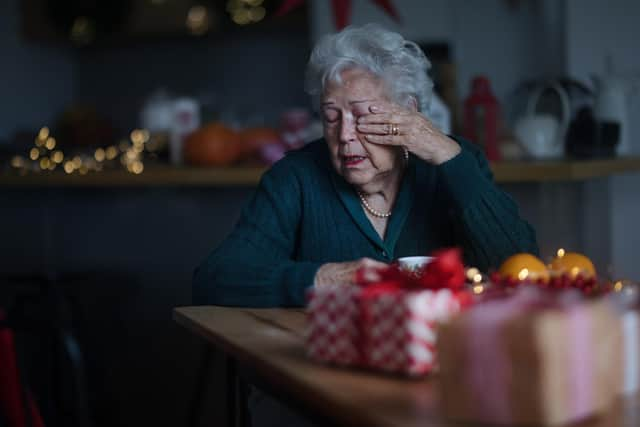Cost of living Scotland: Homes go dark to save energy costs, with new year price cap increase ahead
There will be an increase in the energy price cap at the beginning of the new year Some 1.4 million people in Scotland[1] have sat in the dark rather than turn the lights on to save on energy costs, a charity has revealed. The startling figures have been published by Citizens Advice Scotland (CAS), which analysed research from YouGov.
The study also estimated about 780,000 people have sat in silence without the TV or radio on.

 Citizens Advice Scotland (CAS) analysed research from YouGov and also estimated that around 780,000 people have sat in silence without the TV or radio on (pic: Halfpoint - stock.adobe.com)
Citizens Advice Scotland (CAS) analysed research from YouGov and also estimated that around 780,000 people have sat in silence without the TV or radio on (pic: Halfpoint - stock.adobe.com)CAS said these changes could have a negative impact on someone's wellbeing, and that restricted lighting could present a higher risk of accidents, particularly for elderly people who could be more vulnerable to falling. The findings come as household energy prices rise again in January, with the typical annual household bill going up to GBP1,928, according to Ofgem. The regulator said a typical household paying by direct debit for gas and electricity faces forking out 5 per cent more when compared to the annual cap figure covering September to December, which equates to GBP94 more over the course of a year.
The new average figure largely reflects the cost of wholesale gas rising header into a colder time of the year and includes a shift in Ofgem's cap calculation based on average domestic energy use. Global events and instability, including the war in Ukraine and conflict in the Middle East, are also contributing to higher costs. The Office for National Statistics[2] (ONS) announced this week the latest inflation figure for the UK had fallen to 3.9 per cent, making it the lowest annual rate of price rises in more than two years.
Staples food items, including pasta and milk, were reported as some of the key items that saw price rises slowing down. While the inflation figure is well below its peak in 2022, it is still almost double the Bank of England's 2 per cent target. CAS is running "Worried this Winter" - a campaign to encourage people to seek advice from the network in a variety of ways. People[3] can visit www.cas.org.uk/worried and from there they can choose an option that works for them.
Last year the average financial gain a person saw from energy-related CAB advice in Scotland was more than GBP400. CAS chief executive Derek Mitchell said: "We've reached the time of year where for many of us, Christmas lights are brightening up our homes. But our research has discovered that for more than a million people in Scotland, higher energy bills means sitting in the dark at night.
"We're all familiar with jokes about not having the big light on or a room looking like Blackpool illuminations, and of course we all need to try to save energy where we can. But the impact that poor lighting could have on someone's wellbeing shouldn't be overlooked. The risk of accidents, for example, must be higher, particularly for older or infirm people.
"In addition, we estimate close to 800,000 people in Scotland are sitting with the TV or radio off. That's really worrying for people who live alone, particularly pensioners, for whom the TV or radio is a source of company and comfort. "People who find themselves figuratively and literally in the dark this winter can seek advice and information from the Citizens Advice network.
That doesn't have to be in a local CAB, we have online advice pages and interactive self-help tools, which can help you see where you could cut your costs or boost your income."